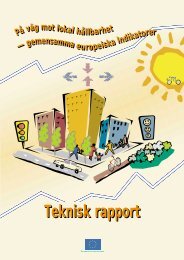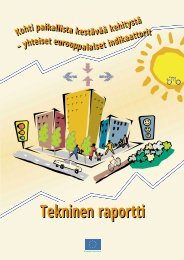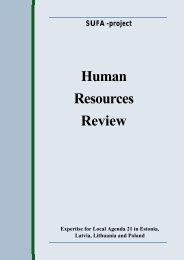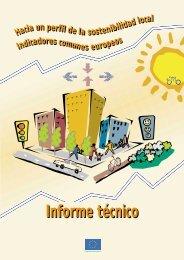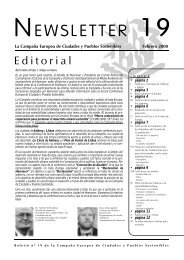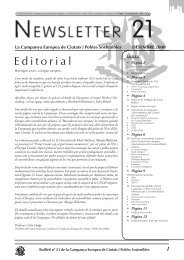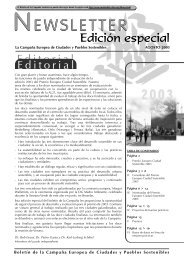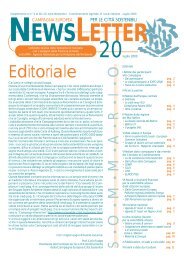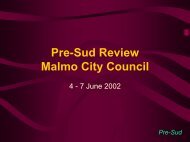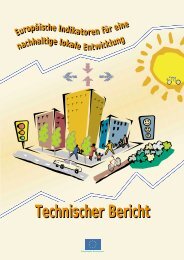the european sustainable cities and towns campaign
the european sustainable cities and towns campaign
the european sustainable cities and towns campaign
You also want an ePaper? Increase the reach of your titles
YUMPU automatically turns print PDFs into web optimized ePapers that Google loves.
GERMANY<br />
Regional Cycles: Regional Economy towards<br />
Sustainability<br />
A Conference on Regional Cycles: Regional Economy<br />
towards Sustainability is being been organised by ICLEI on<br />
behalf of <strong>the</strong> German Federal Ministry of Education <strong>and</strong><br />
Research in Leipzig, Germany from 31 October to 2<br />
November 2002.<br />
Regional economy as an instrument for <strong>sustainable</strong><br />
development has raised a lot of interest among researchers<br />
<strong>and</strong> policy makers in recent years. The issues to be raised<br />
at this conference are <strong>the</strong>refore how economic activities<br />
can best be implemented at regional level, where regional<br />
cycles make sense, <strong>and</strong> how can European Regions learn<br />
from each o<strong>the</strong>r.<br />
pConference secretariat: F: +49 761 36892 29<br />
E-mail: euregia-conference@iclei-europe.org<br />
VIII• OTHER INITIATIVES<br />
RELEVANT FOR<br />
URBAN SUSTAINABILITY &<br />
GLOBAL LINKAGES TO THE<br />
C A M P A I G N<br />
PASTILLE Conference in London<br />
In September 2002 <strong>the</strong> PASTILLE research consortium <strong>and</strong><br />
<strong>the</strong> European Common Indicators Project will host a joint<br />
conference in London on <strong>the</strong> topic of Local Sustainability<br />
Indicators.<br />
The conference will mark <strong>the</strong> completion of <strong>the</strong> Pastille<br />
project - 30 months of action research on <strong>the</strong> use of local<br />
sustainability indicators carried out by teams in Austria,<br />
France, Switzerl<strong>and</strong> <strong>and</strong> <strong>the</strong> U.K. By means of a series of<br />
case studies, <strong>the</strong> project teams analysed <strong>the</strong> way in which<br />
sustainability indicators are developed <strong>and</strong> examined <strong>the</strong>ir<br />
ability to bring about effective change in policy making.<br />
Key findings <strong>and</strong> recommendations will be compiled into a<br />
Practitioner’s Guide to be launched at <strong>the</strong> conference.<br />
The event will also present findings from <strong>the</strong> pilot stage of<br />
<strong>the</strong> European Common Indicators initiative referred to on<br />
page XX of this newsletter<br />
pWendy Foulds, T: +44 20 7849 4951<br />
E-mail: pastille@lse.ac.uk<br />
Web:<br />
www.lse.ac.uk/Depts/geography/Pastille/default.htmEuropean<br />
Car-Sharing project MOSES: new brochure published<br />
The European MOSES project (MObility SErvices for urban<br />
Sustainability), co-funded by <strong>the</strong> EU’s Research programme<br />
(FP5), has published a project brochure introducing <strong>the</strong><br />
project <strong>and</strong> <strong>the</strong> different activities amongst <strong>the</strong> participating<br />
partners (Bremen, Genoa, London-Southwark, London-<br />
Sutton, Palermo, Stockholm, Turin, Wallonia, UITP).<br />
bwbnn<br />
It demonstrates how Car-Sharing functions <strong>and</strong> how it can<br />
help, as a supplement to public transport, taxis, car rental,<br />
walking <strong>and</strong> cycling, to solve mobility problems. All<br />
participating <strong>cities</strong> will develop fur<strong>the</strong>r or start up Car-<br />
Sharing schemes with interesting <strong>and</strong> challenging different<br />
features. MOSES has set itself <strong>the</strong> ambitious target of<br />
achieving 12,000 Car-Sharing users by <strong>the</strong> end of <strong>the</strong><br />
project in October 2004.<br />
pCopy of <strong>the</strong> brochure at T: +49 421 361 16956<br />
E-mail: moses@umwelt.bremen.de<br />
Web: www.moses-europe.org<br />
Transport Development Areas (TDAs) - using l<strong>and</strong> use<br />
planning to promote regeneration around public<br />
transport nodes<br />
L<strong>and</strong> use planning is widely seen as a key mechanism for<br />
delivering a more <strong>sustainable</strong> <strong>and</strong> integrated transport<br />
system. Siân Hughes introduces newly published guidance<br />
from RICS (Royal Institution of Chartered Surveyors) that<br />
provides a framework for achieving a more <strong>sustainable</strong><br />
urban model by integrating l<strong>and</strong> use planning <strong>and</strong> transport<br />
policy.<br />
In July 2000, RICS launched Transport Development Areas<br />
(TDAs) – a UK based study into achieving higher density<br />
development around transport nodes. This research, cofunded<br />
by <strong>the</strong> UK’s Department of Environment Transport<br />
<strong>and</strong> <strong>the</strong> Regions, demonstrates, through a number of case<br />
studies, <strong>the</strong> benefits that can be gained from providing<br />
higher-density, high-quality, mixed-use development<br />
around transport nodes.<br />
Using existing policy <strong>and</strong> legislation, planners are<br />
encouraged under <strong>the</strong> TDA concept to grant permission for<br />
higher density developments around significant transport<br />
hubs. In exchange for this permission, <strong>the</strong> developer may<br />
help to fund improvements to local transport facilities.<br />
TDAs have <strong>the</strong> potential to promote regeneration <strong>and</strong>,<br />
because of increased densities of development, maximize<br />
<strong>the</strong> use of brownfield sites. Consumers, commuters <strong>and</strong><br />
o<strong>the</strong>rs are placed within reach of a range of services <strong>and</strong><br />
opportunities <strong>and</strong> are offered a choice of transport modes.<br />
The research shows how high density developments of this<br />
nature can be achieved without detriment to <strong>the</strong> urban<br />
environment.<br />
The TDA project continues to attract wide support from a<br />
range of groups. These include Railtrack, <strong>the</strong> Local<br />
Government Association, <strong>the</strong> Greater London Authority,<br />
Scottish Enterprise <strong>and</strong> <strong>the</strong> Institution of Highways <strong>and</strong><br />
Transportation. Interest in <strong>the</strong> TDA concept is also<br />
reflected by <strong>the</strong> recognition of <strong>the</strong> model in <strong>the</strong> national<br />
planning policy framework (PPG13) <strong>and</strong> its inclusion in <strong>the</strong><br />
draft Spatial Development Strategy for London.<br />
Copies of <strong>the</strong> TDA guidance is available at <strong>the</strong> end of May<br />
pEwan Willars, E-mail: ewillars@rics.org.uk or<br />
Siân Hughes, E-mail: shughes@rics.org Web: www.rics.org<br />
SUTRA – Sustainable Urban Transportation<br />
SUTRA is funded by <strong>the</strong> Research programme (FP5) of <strong>the</strong><br />
European Commission under <strong>the</strong> key action: City of<br />
Tomorrow <strong>and</strong> involves case studies from Buenos Aires,<br />
Gdansk, Genoa, Geneva, Lisbon, Tel Aviv <strong>and</strong><br />
Thessaloniki.<br />
It aims to develop a consistent <strong>and</strong> comprehensive<br />
approach <strong>and</strong> planning methodology for <strong>the</strong> analysis of<br />
urban transportation problems, that will help to design<br />
strategies for <strong>sustainable</strong> <strong>cities</strong> through <strong>the</strong> integration of<br />
socio-economic, environmental <strong>and</strong> technological<br />
concepts. This will include <strong>the</strong> development, integration,<br />
<strong>and</strong> demonstration of tools <strong>and</strong> methodologies to improve<br />
forecasting, assessment <strong>and</strong> give support to policy level<br />
decision making. SUTRA combines an indicator based<br />
Newsletter 25 of The European Sustainable Cities & Towns Campaign<br />
9



